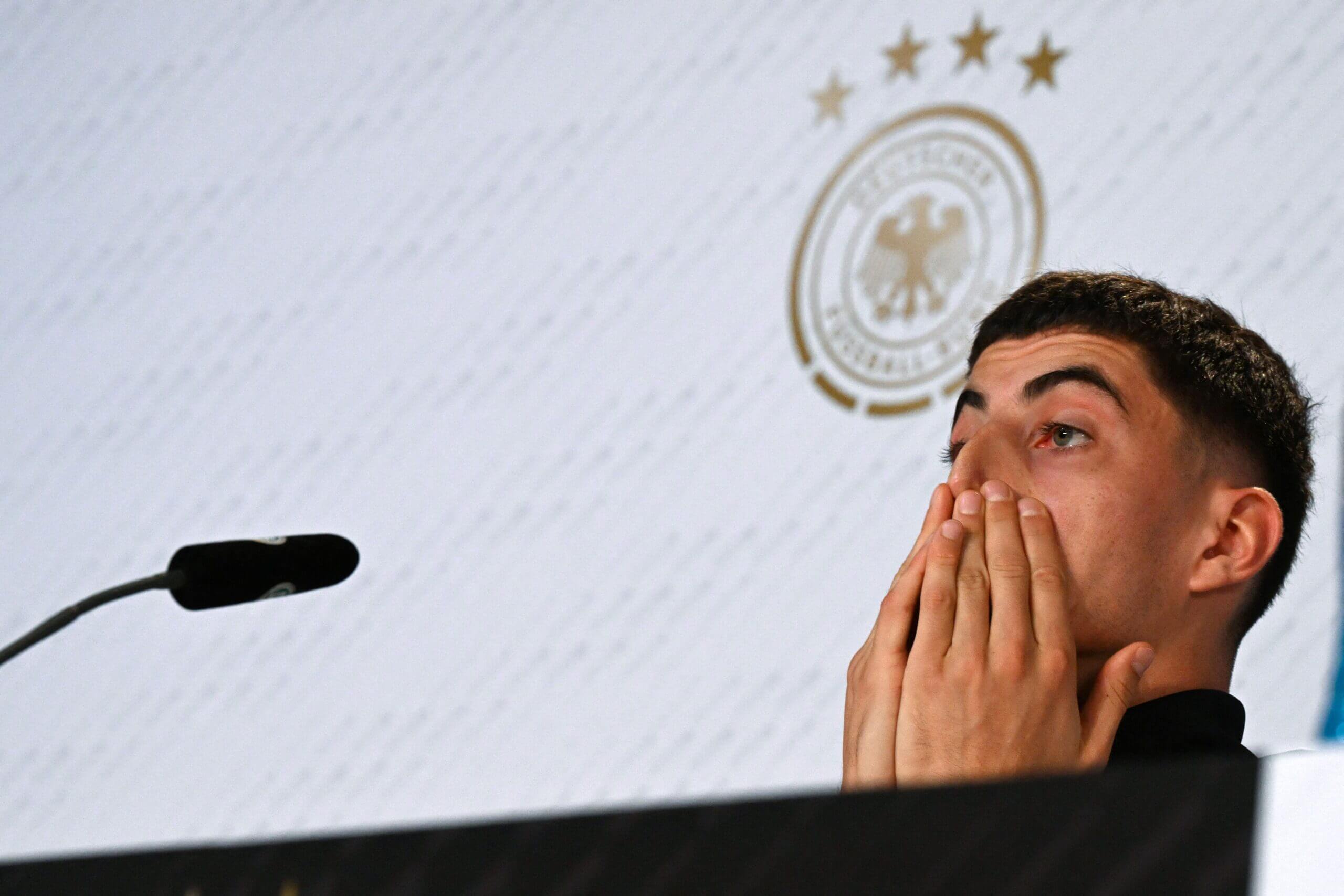Germany defeated Costa Rica in the final match of Group E play, but were eliminated from the World Cup.
You could see the planning that had gone into putting Kai Havertz and Julian Brandt on the press conference podium on Friday.
The Chelsea and Borussia Dortmund forwards are good buddies from their joint time at Bayer Leverkusen and often joke together in front of the press.
Advertisement
The German FA must have thought a few good vibes wouldn’t go amiss after their 2022 World Cup began with that disastrous 2-1 opening defeat by Japan. In addition, Brandt was only tangentially involved in the World Cup catastrophe in Russia four years ago — the attacking midfielder came on as a substitute in all three games for a grand total of 20 minutes — while Havertz didn’t play in that tournament at all.
Bad memories were kept at bay as a consequence. Neither player attracted a single question on possible parallels between that group stage exit as world champions and the precarious situation that faces the team in their middle Group E game this Sunday.
But it wasn’t all sunshine and giggles either, as the pair had to walk a tightrope in front of reporters at the Al Shamal training ground.
It was vital for them to acknowledge the seriousness of Germany’s position and not to sugar-coat the mistakes that had been made on Wednesday, for fear of being seen as out of touch with reality. Yet both also needed to project some positivity ahead of a must-win game against Luis Enrique’s high-scoring Spaniards.

Brandt dealt very well with that dilemma.
The 26-year-old revealed the team had analysed “all the things we didn’t do well” in great detail in a squad meeting on Thursday, and that “there was a good exchange of views” by those who had played, those who hadn’t, and manager Hansi Flick.
“I got the sense that everybody left the room feeling that we have the right mindset to win the game (against Spain).”
His experience at last year’s European Championship, he added, was cause for optimism, too. “We know we’re in the shit now, but we lost the opening game against France (at the Euros), then beat Portugal to qualify for the knockouts. We should see Sunday as a chance to create some energy and turn things around. We will be well prepared.”
Advertisement
The inconvenient fact that Germany lost 6-0 in Spain in the Nations League two years ago didn’t bother him at all, Brandt claimed.
Havertz had a more difficult time hiding his frustrations.
The Chelsea forward admitted he hadn’t been “100 per cent integrated” in Germany’s game during his ineffective 79-minute outing and confessed to carrying “a lot of anger in my belly”.

Kai Havertz’s low number of carries against Japan highlights his lack of involvement in the game
When a reporter asked about his best position, Havertz said he found it “annoying” to get into that debate again, since everybody knew he could play anywhere across the forward positions and was very “happy” in the false nine role he has recently occupied in the national team.
Another query that implied the loss to Japan should be seen in the wider context of Germany’s poor 2022 (three wins, five draws, two defeats) brought a sharper reaction, still.
“I don’t quite get this question,” Havertz snapped back. “I understand that there’s a lot of negativity among fans and the media, that people are always having a pop at us, that not everyone supports us. But I don’t see the point of looking at the past. I’m only focused on Sunday.
“After digesting this loss for a couple of days and talking about it, that sense of anticipation is coming back.”

The positivity on display felt a little forced but genuine enough under the circumstances. But the precise tone adopted at that team meeting is likely to have a bigger impact on Germany’s chances to retain an interest in the competition beyond the weekend.
The public criticism dished out by players Ilkay Gundogan, Manuel Neuer (Germany’s captain) and Antonio Rudiger in the mixed zone on Sunday had raised eyebrows inside and outside the dressing room. Inevitably, it raised the worrying prospect of different sections of the team being at odds with each other over the precise reasons for the defeat.
| Year | Finished |
|---|---|
1930 | Did not enter |
1934 | 3rd place |
1938 | 1st round |
1950* | Banned |
1954* | Champions |
1958* | 4th place |
1962* | Quarter-finals |
1966* | Runners-up |
1970* | 3rd place |
1974* | Champions |
1978* | 2nd group stage |
1982* | Runners-up |
1986* | Runners-up |
1990* | Champions |
1994 | Quarter-finals |
1998 | Quarter-finals |
2002 | Runners-up |
2006 | 3rd place |
2010 | 3rd place |
2014 | Champions |
2018 | Group stage |
* As West Germany |
According to Havertz, some of the things that were said in the thorough analysis session had “not been nice”; there had been “different opinions” and some players had “a go at each other”, he revealed. But he also insisted that such frank exchanges weren’t just “normal” but “good” for the squad.
“This helps you progress as a team. We have waited 15 months for this World Cup, this is the time to talk to each other. We have good characters in the side, we like speaking to each other openly, face to face, and say what was wrong and what was right.”
Pressed whether it might have been preferable if Gundogan et al had voiced their concerns internally, Havertz replied that it didn’t really matter and that the criticism had been “constructive” in any case: “No one’s angry about that.”
If that wasn’t just the PR version but the accurate description of a session that’s likely to go down in German World Cup history, one way or another, maybe not all is lost.
Germany have to learn the lesson of the Japan game collectively and stay together in spirit to overcome a Spain side who are full of confidence.
Those looking for another protest for human rights before kick-off, incidentally, shouldn’t hold their breath.
“Everyone knows what we think,” Havertz said. “The focus is on football now. We made our point.”
On Sunday, they’ll need three of them.

GO DEEPER
Every World Cup question you’ve been too afraid to ask
(Top photo: Alexander Hassenstein/Getty Images)

